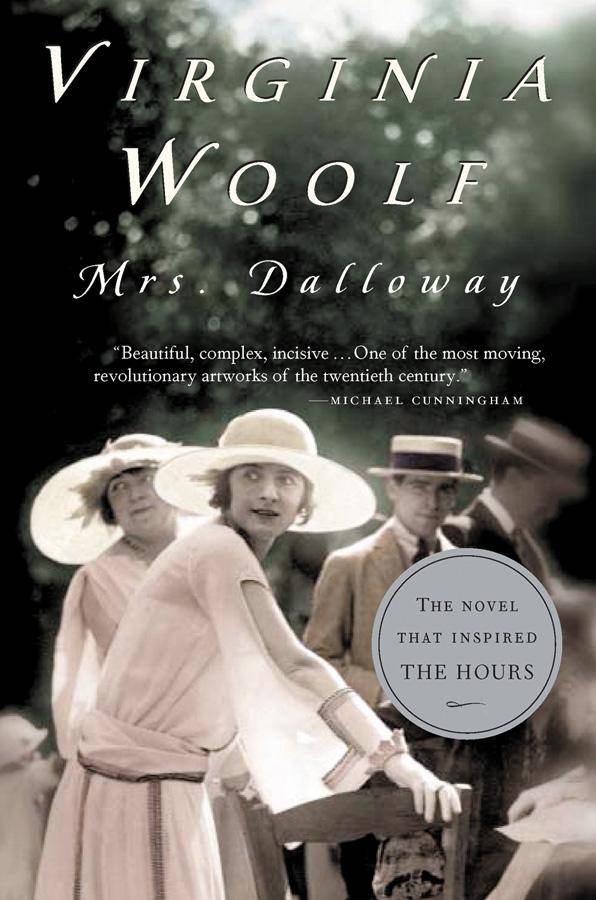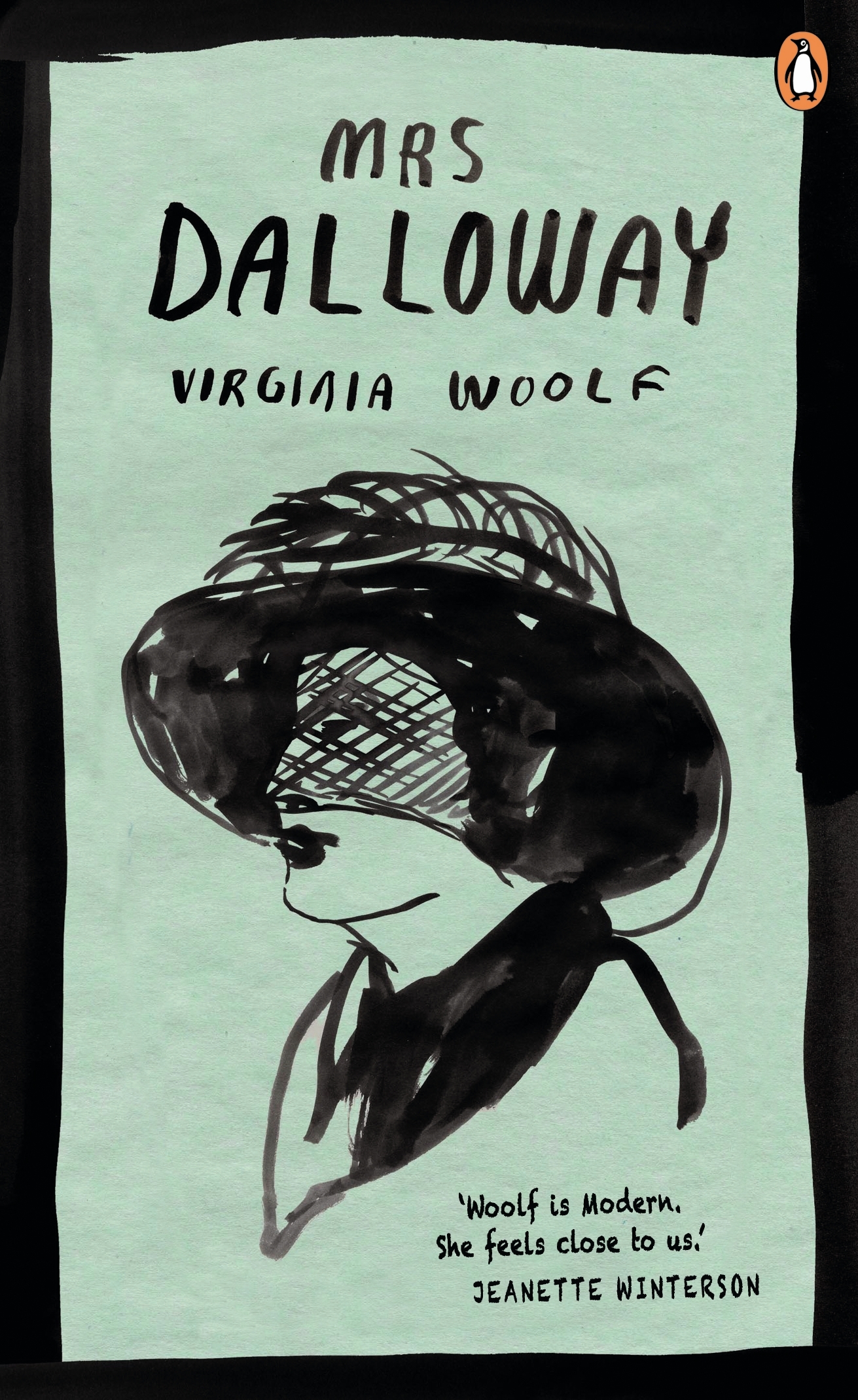"This late age of the world's experience had bred in them all, all men and women, a well of tears"
 Mrs. Dalloway by Virginia Woolf is written in a stream-of-consciousness form; as were many modernist literature. The story is set in only one day, as Clarissa Dalloway organizes a party. The story reveals her thoughts and ideas. It also explores the interwoven stories of Dalloway's friends and husband. The story is told in parallel with a War Veteran suffering from post traumatic stress disorder. Even though the veteran is quite disillusioned he shares Clarissa's feeling of oppression by society.
Mrs. Dalloway by Virginia Woolf is written in a stream-of-consciousness form; as were many modernist literature. The story is set in only one day, as Clarissa Dalloway organizes a party. The story reveals her thoughts and ideas. It also explores the interwoven stories of Dalloway's friends and husband. The story is told in parallel with a War Veteran suffering from post traumatic stress disorder. Even though the veteran is quite disillusioned he shares Clarissa's feeling of oppression by society.
Personally, I did not enjoy this book as much as I had hoped to. This is due to my own dislike of the usual modernist style. I much prefer structure and a full narrative. However, I do enjoy analyzing and breaking apart this style of story. The more you analyse the more little 'tricks' and ideas of life and society that were so subtly criticized/analysed are discovered.
 The idea that stood out for me was of self-discovery and reflection of human character. The style of Woolf's writing (stream-of-consciousness) allows the readers to gain a deeper understanding of the characters, by dwelling deeper into the mind. Clarissa uses the word, "dark" to describe her soul, meaning that her soul is not open for public view. People are always having internal dialogue but many times don't or find hard to communicate. Clarissa's husband wishes to tell Clarissa he lover her, but he cannot find the courage and instead gives the flowers as a symbol. By letting the reader into the protagonists'mind there is a much greater understanding of human nature as explored by Woolf; the reader is able to follow Clarissa's reflections and journey to self-discovery. Clarissa reflects on the past as a way to think about the decisions she has made and how she became to be who she is. Most of all there is a significance to the title of the book and that the first word of the novel is, "Mrs. Dalloway" - Clarissa questions her choice to marry Richard instead of Peter. Clarissa chose safety over passion. Clarissa has grown to be a society hostess. Peter blames Richard for making Clarissa be the way she is. Peter thinks this, because he doesn't want to admit how Clarissa has changed, and how cold and shut from him she has become. However, independent of Peter's bias in saying that Richard has infused his personality into Clarissa, it is a valid fact. The people that are with us, influence us to change. That is why that reflecting about marital choices is really a path into self-discovery by Clarissa. The idea of marriage is quite a contrast to Clarissa's old self. She once shared a kiss with Sally, this kiss was very different to the kiss Sally shared with Hugh- It was innocent but a sign of passion. Clarissa, without understanding it herself, felt an attraction towards Sally, something that would have not been accepted by the British society. So, even though Clarissa and Sally despised the idea of marriage when they were children, they grew up to marry and have children just like proper British ladies. Clarissa also realizes that she is always changing - her personality changes according to whom she is talking to. She is different when she is with Richard than when she is with Peter or Hugh. This is then a hint that characters should be analysed as to how they react to the environment and people they meet. When Peter Walsh hears an old woman singing, he compares her to a rusty pump and feels sorry for her. Rezia, however, see this woman and finds strength in the lyrics. Women are shown to be more attuned to nature and external messages.
The idea that stood out for me was of self-discovery and reflection of human character. The style of Woolf's writing (stream-of-consciousness) allows the readers to gain a deeper understanding of the characters, by dwelling deeper into the mind. Clarissa uses the word, "dark" to describe her soul, meaning that her soul is not open for public view. People are always having internal dialogue but many times don't or find hard to communicate. Clarissa's husband wishes to tell Clarissa he lover her, but he cannot find the courage and instead gives the flowers as a symbol. By letting the reader into the protagonists'mind there is a much greater understanding of human nature as explored by Woolf; the reader is able to follow Clarissa's reflections and journey to self-discovery. Clarissa reflects on the past as a way to think about the decisions she has made and how she became to be who she is. Most of all there is a significance to the title of the book and that the first word of the novel is, "Mrs. Dalloway" - Clarissa questions her choice to marry Richard instead of Peter. Clarissa chose safety over passion. Clarissa has grown to be a society hostess. Peter blames Richard for making Clarissa be the way she is. Peter thinks this, because he doesn't want to admit how Clarissa has changed, and how cold and shut from him she has become. However, independent of Peter's bias in saying that Richard has infused his personality into Clarissa, it is a valid fact. The people that are with us, influence us to change. That is why that reflecting about marital choices is really a path into self-discovery by Clarissa. The idea of marriage is quite a contrast to Clarissa's old self. She once shared a kiss with Sally, this kiss was very different to the kiss Sally shared with Hugh- It was innocent but a sign of passion. Clarissa, without understanding it herself, felt an attraction towards Sally, something that would have not been accepted by the British society. So, even though Clarissa and Sally despised the idea of marriage when they were children, they grew up to marry and have children just like proper British ladies. Clarissa also realizes that she is always changing - her personality changes according to whom she is talking to. She is different when she is with Richard than when she is with Peter or Hugh. This is then a hint that characters should be analysed as to how they react to the environment and people they meet. When Peter Walsh hears an old woman singing, he compares her to a rusty pump and feels sorry for her. Rezia, however, see this woman and finds strength in the lyrics. Women are shown to be more attuned to nature and external messages.  The second idea is of the discovery of life - life versus death as well as the functioning of society. Clarissa is spontaneous and full of ideas but she manages to conceal these 'flaws', therefore she sees the beauty of London but she keeps her distance, allowing for Clarissa to analyse life as if it were spread out like a painting. In the beginning, Clarissa believes that life is "dangerous". Clarissa at one point repeats Shakespeare's line from Cymbeline, "Fear no more the heat o' the sun/ Nor the furious winter's rages". This celebrated death as comfort after the hardships of life. The oppression and pressure by society encourages this take on life and it was felt by Clarissa and Septimus. Those in the upper class cherished their family status and for those in the lower classes it was very hard to move up the social ladder. All of Clarissa friends are from the same high end, and she disliked Ellie Henderson because of her being 'inferior'. This unfairness all becomes very clear to Septimus as he becomes more attuned to society after serving in the war. He could not do with any more of the silly rules and behaviours of society, and therefore to free himself, he committed suicide. While Clarissa participated in trivial social rules and hierarchy, she does feel the pressure and understands why Septimus ended his life. This was demonstrated by her reaction to the news of the death, "But what an extraordinary night! She felt somehow very like him - the young man who had killed himself. She felt glad that he had done it; thrown it away." However, Septimus' suicide allowed Clarissa to see again the beauty of life - this is shown by the neighbour next door acknowledging Clarissa, "Oh but how surprising! - in the room opposite the lady stared straight at her!" The whole book had set society as a prison - everyone felt trapped in life. Even Elizabeth, the youngest character, felt trapped by her parents and Miss Kilman. "And did Elizabeth give one thought to poor Miss Kilman...? She was delighted to be free. The fresh air was so delicious." (when she went off alone on an omnibus, to explore London). However, the end was very optimistic. Clarissa heads to Peter Walsh and he lets his mind free by admitting to his love for Clarissa, "For there she was."
The second idea is of the discovery of life - life versus death as well as the functioning of society. Clarissa is spontaneous and full of ideas but she manages to conceal these 'flaws', therefore she sees the beauty of London but she keeps her distance, allowing for Clarissa to analyse life as if it were spread out like a painting. In the beginning, Clarissa believes that life is "dangerous". Clarissa at one point repeats Shakespeare's line from Cymbeline, "Fear no more the heat o' the sun/ Nor the furious winter's rages". This celebrated death as comfort after the hardships of life. The oppression and pressure by society encourages this take on life and it was felt by Clarissa and Septimus. Those in the upper class cherished their family status and for those in the lower classes it was very hard to move up the social ladder. All of Clarissa friends are from the same high end, and she disliked Ellie Henderson because of her being 'inferior'. This unfairness all becomes very clear to Septimus as he becomes more attuned to society after serving in the war. He could not do with any more of the silly rules and behaviours of society, and therefore to free himself, he committed suicide. While Clarissa participated in trivial social rules and hierarchy, she does feel the pressure and understands why Septimus ended his life. This was demonstrated by her reaction to the news of the death, "But what an extraordinary night! She felt somehow very like him - the young man who had killed himself. She felt glad that he had done it; thrown it away." However, Septimus' suicide allowed Clarissa to see again the beauty of life - this is shown by the neighbour next door acknowledging Clarissa, "Oh but how surprising! - in the room opposite the lady stared straight at her!" The whole book had set society as a prison - everyone felt trapped in life. Even Elizabeth, the youngest character, felt trapped by her parents and Miss Kilman. "And did Elizabeth give one thought to poor Miss Kilman...? She was delighted to be free. The fresh air was so delicious." (when she went off alone on an omnibus, to explore London). However, the end was very optimistic. Clarissa heads to Peter Walsh and he lets his mind free by admitting to his love for Clarissa, "For there she was."
No comments:
Post a Comment